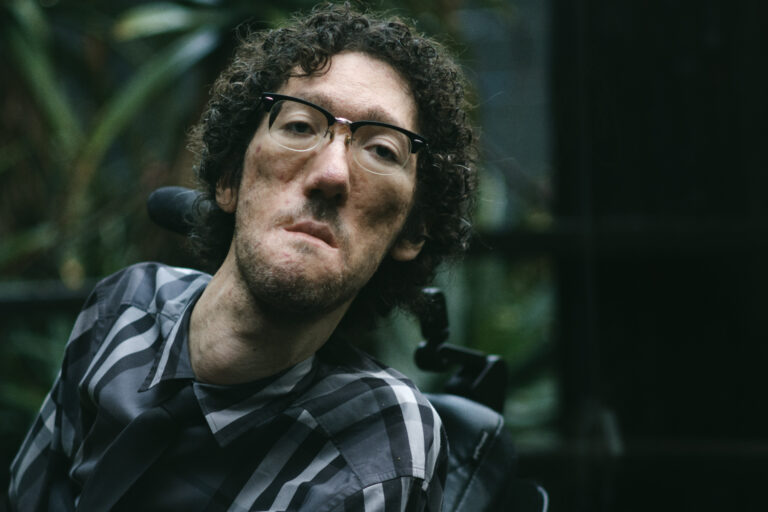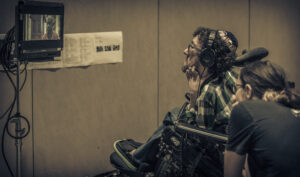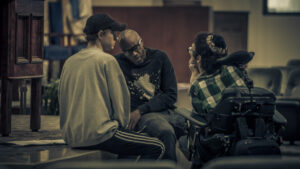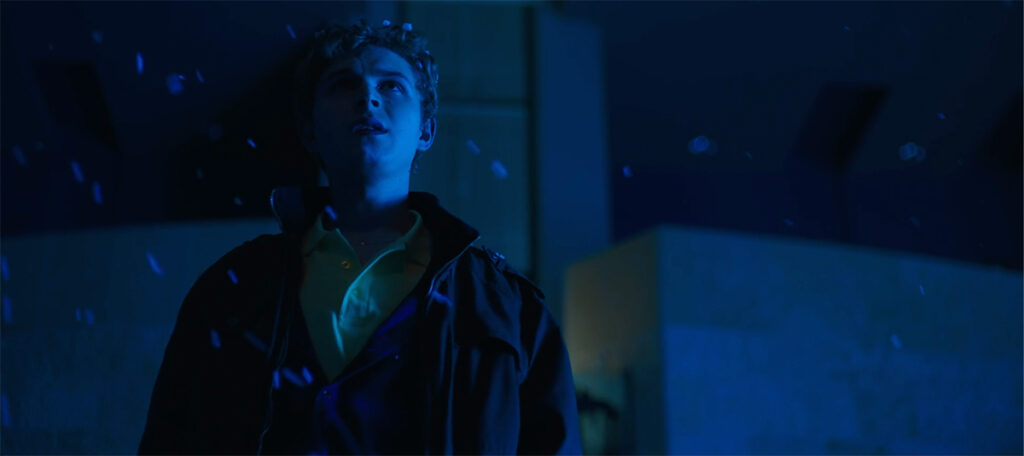
This week @guidetofilmtvpost’s blog interviewed talented writer, producer, director Michael Carnick. Michael also happens to be disabled which only seems to enhance his storytelling, and drive his vision as a filmmaker.
Michael started young, he says he’s always had the storytelling bug. As a teenager he was an artist, wrote short stories and interned as a video game 3D animator.
In college, Michael went for his undergrad in 2005 at U.C. San Diego, where he studied under Professor Allen Davis. Davis had them write a screenplay as a final project. Afterwards, the school encouraged Michael to submit to the Samuel Goldwyn awards. He ended up winning the Grand Prize with his very first screenplay as an undergrad. He was, by the way, the first undergrad to ever receive this prestigious award.
To hell with the odds, to hell with the challenges, I’m going to do it.
We spoke with Michael regarding his film “The Forbidden Wish,” which takes place on the eve of Yom Kippur. The story centers around a troubled young man (John Berchtold, “Manhunt”) who retreats to his childhood synagogue, where a chance meeting with an Ethiopian born rabbi (Sammi Rotibi, “Django Unchained”) leads to an existential discussion exploring deeply held issues of relationships, mental health and faith. Both men are inevitably faced with the ultimate choice.
The project appears to be a family affair, with Michael’s cousin, Gabriel Carnick, shooting the film. The Forbidden Wish was their first feature film together. Their first project, however, was a TV pilot in 2018 called “Manny Fantasma,” which won awards at festivals across the world. Michael calls Gabriel “extremely talented” and says they work together great, because they have a lot of the same sensibilities with storytelling, and a focus on human interest and social justice. “She sees a lot of what I see.”

While it wasn’t necessarily anything he set out to do, Michael loved having a diverse cast & crew, it just kind of came together. He looks primarily at talent, not at people. He has to enjoy working with them, gel with them easily, there needs to be a trust there, that’s all that matters, nothing else. He wants to give actors a lot of room to play, improv and organically work through the process. Nothing feels forced. “Awesome having folks from different backgrounds.” This offers different perspective.
Michael doesn’t like to micromanage his crews. Instead he works with people who have the same goal and vision, who he can easily communicate with, then give room to create, collaborate and input.
The pandemic lockdown did not affect their production (it was all shot and in the can prior to the lockdown). It also did not affect their postproduction process too much, they started their post before the lockdown and once it took effect, they moved to teleconferencing, and handled it all via remote editing and post. They would send hard drives back and forth and sanitized everything. They kept a distance from each other. When asked if this was difficult, he just says 2020 felt like a blur.
Powerful stories are the ones you walk away with a different perspective.
Looking at Michael’s current and prior projects, he does seem drawn to projects with human interest stories, diversity and adversity layers. Michael says inspiration for The Forbidden Wish came in 2009, when he came across a story while pursuing his masters at UC Riverside. It was a YouTube documentary on a particular Jewish story of two men in different circumstances, different backgrounds. This was an opportunity for him to learn something new and explore something culturally and thematically that had not necessarily been explored a lot in American cinema. He was inspired to write it, originally as a one act play, then adapted to a feature film.
We asked, “what is your favorite part of the process? Which is most challenging and most rewarding? Which makes you happiest?” Michael explained, “happiness is kind of a loaded word, but he is happiest on set directing.” Writing is also a big interest to him, but he loves the energy and collaboration of being on a set. As with most filmmakers we speak to, postproduction seems to be the most tedious. “The Forbidden Wish” is his feature directorial debut, but as mentioned he directed a TV pilot prior, and before that he wrote and produced a feature that was picked up by Netflix, titled “Who’s Driving Doug?” starring RJ Mitte (“Breaking Bad”).
In a position of calling the shots, Michael wears a lot of hats. Have we mentioned that Michael is a disabled director? It’s not Michael’s primary focus but it is something he seems to embrace and it has shown no sign of slowing him down. He says it can be challenging on set where you have an environment filled with equipment and people to navigate, but otherwise it’s really all about telling the story and getting the shots. He doesn’t know a lot of directors like himself, “There aren’t many out there.” Michael was born with a rare physical disability which confines him to an electric wheelchair, it’s all he knows. He says “to hell with the odds, to hell with the challenges, I’m going to do it.”

Carnick’s work is often centered around the themes of disability awareness and the human experience of being a minority. In addition to disability, he tends to highlight LGBTQ+, women stories, racial inequality, unheard voices… through empathy and deep self reflection of the united human spirit. “Write what you know,” all of Michael’s scripts have a diversity, adversity element. He believes the human element makes a more interesting story. When he watches someone else’s film he wants to learn something new about someone else’s experience. “Powerful stories are the ones you walk away with a different perspective.”
Social media and isolation have people stuck in closed off bubbles, it’s important to expand those bubbles, stir the pot, move people, make them uncomfortable. Disruption causes conversation.
His advice to other filmmakers is to take it one day at a time in making your film. It’s all a process, try to write a page a day, have something to look forward to the next day.
As far as adversity goes, it’s a tough industry, marketing research dictates what the industry pushes as “what people want to see.” There are times he has had to self produce his own work to get his story out there. It is not always easy to find the people who will support these dramatic human stories over the next horror film or remake, but don’t give up there are enough people out there who appreciate these deep real stories written from the heart. These are the kind of films he looks for and appreciates. They’re the ones that stick with you.
Michael mentioned his favorite shot during filming The Forbidden Wish, a character is having a memory and suddenly it begins to snow inside the synagogue, snowflakes falling, landing on the character. It was a cinematic moment. They didn’t tell the actor ahead of time, wanted a genuine raw response from the character. “It ended up being a very beautiful moment, the actor didn’t miss a beat.” It was Michael’s favorite moment of the whole film, he was thrilled with the way it all turned out.

Next up for Michael and his crew is “People To People,” a documentary about an Israeli philanthropic organization in San Diego. Filming began at the start of the pandemic, but was interrupted briefly. It is now moving forward again.
Check out “The Forbidden Wish,” currently on Amazon, iTunes, Vulu, etc.).
For more info and updates on the film and on Michael follow on:
INSTAGRAM & TWITTER & FACEBOOK
@4biddenwish
@michaelcarnick
https://www.facebook.com/4biddenwish
PUBLICIST
Melanie Marquez at Prism MG
@m4pr
@m4pr_mel